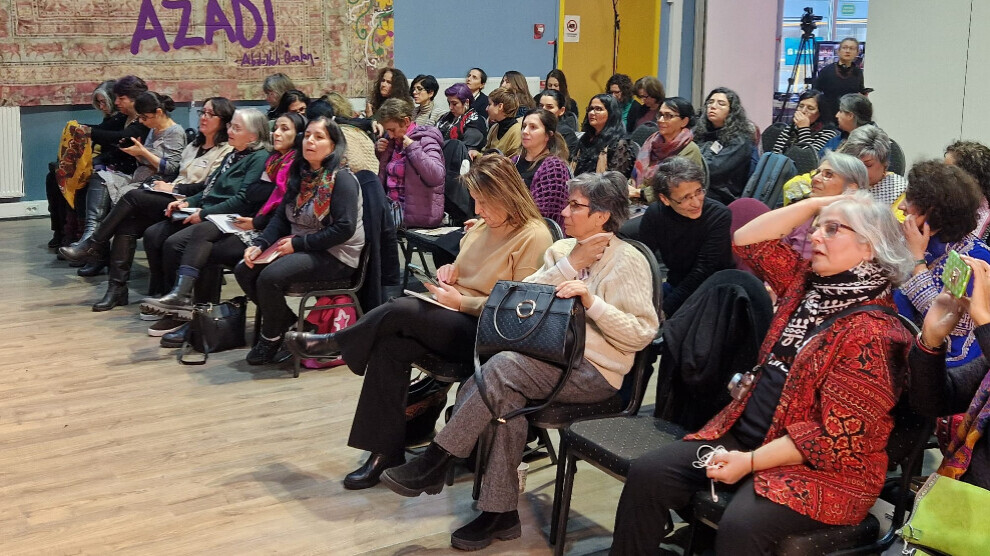Rojîn Mokriyani: Women's unity and resistance are still not strong enough
A "Jin, Jiyan, Azadî" conference was organized by Komalên Azadiya Jinên Kurdistan (Eastern Kurdistan Women's Community-KJAR) in Stockholm.
A "Jin, Jiyan, Azadî" conference was organized by Komalên Azadiya Jinên Kurdistan (Eastern Kurdistan Women's Community-KJAR) in Stockholm.

A "Jin, Jiyan, Azadî" conference was organized by Komalên Azadiya Jinên Kurdistan (Eastern Kurdistan Women's Community-KJAR) in Stockholm.
Dr. Nîda Hoşeg, known for her works at the Swedish and Canadian Academy, talked about the destruction of Middle Eastern cities, ecology and settlements, as well as the ecological revolution and the women's revolution.
Pointing out that the rulers in the Middle East, especially the Iranian regime, destroy the nature and cities of Iran and Kurdistan in order to maintain their dictatorship, Hoşeng said: “The lives of millions of people are being increasingly destroyed. At this point, even drinking water is something that not everyone can have in Iran. Not sharing natural resources with everyone has become the cause of major conflicts between segments of society. The impact of the destruction of nature was undoubtedly greatest on women.”
The academic continued: “When there is a crisis in the whole society, whichever part of the society is more affected by it is at the forefront of the resistance. If women are most affected by the destruction of ecology, we can say that women will be at the forefront of resistance to defend nature. From this point on, the alternative of resistance in the name of ecology is at the center of feminist resistance. We see that women migrate and leave their lands due to occupation policies. The state's violence against them has not decreased, and the state has turned the whole country into a military industry. For these reasons, the word 'ecofeminism' is now on the agenda of women in Iran and Rojhilat Kurdistan. This understanding came to the fore even more strongly after the murder of Jina Amini and the ‘Jin Jiyan Azadi’ rebellion.”
Dr. Rojîn Mokriyani, who graduated from Cork College University in Ireland and has been working on domination, occupation, and the construction of nationalist power, said that although women's resistance is talked about all over the world, this fact should be taken into consideration and for the unity of the resistance, the nation-state system, which builds itself on the ecological, economic, crisis of aggression and occupation, should be discussed.
Ethnic genocide, sexual violence and destruction emerged
Dr. Mokrîyani added: “Current problems in the Iranian territory have become such that we look at the roots and sources of all problems together. Iran is also a nation state system. For example, the nation-state-male domination system and capitalism have combined in every aspect, and as a result, ethnic genocide, sexual violence and destruction, labor exploitation as well as ecological destruction have emerged.”
Mokrîyani continued: “After Jina Amini's murder, such a big rebellion broke out that the whole world is now definitely talking about women's unity and resistance. However, the parties to this resistance have not yet strengthened their relations in a deep and healthy way. Since the national issue is not discussed, not every segment of society can take a stronger part in the resistance. For example, the issue of Kurdistan or Baluchistan was never discussed during the entire rebellion process. Resistance parties could not build a common language and discourse on this basis. In particular, the failure to find a solution to the multinational problem caused major conflicts between Iran's leftist groups and factions. KJAR clearly said in its statement that the freedom movement has a real mission and paradigm for the solution to the national problem, and the architect of this paradigm is Abdullah Öcalan. If they unite for a solution on the basis of a free nation, the source of all existing problems - that is the nation-state - dissolves.”